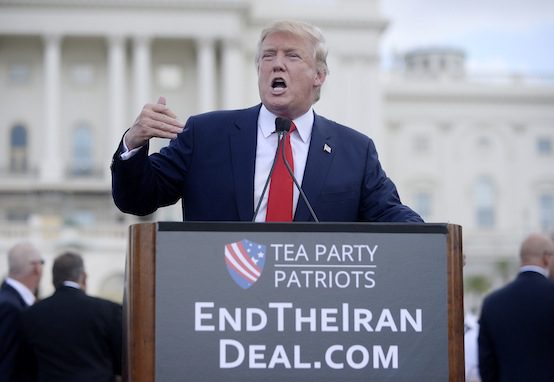Reneging on the Nuclear Deal Has Consequences

Iran’s government isn’t interested in meeting with Trump as long as the U.S. stays out of the JCPOA:
Iranian officials reacted skeptically on Tuesday to President Donald Trump’s comments that he’s willing to negotiate with his Iranian counterpart, saying instead that if Trump wants talks, he needs to rejoin the international nuclear deal he unilaterally pulled out of earlier this year.
Reneging on the nuclear deal with Iran ensured that there would be no more negotiations between the U.S. and Iran for years to come. The limited goodwill and diplomatic channels that the nuclear negotiations created between Washington and Tehran were extinguished by Trump, and they can’t be suddenly restored. Trump spent years trashing the deal, then he violated it, and he has been seeking to cause its complete collapse ever since. You can’t toss aside a major diplomatic agreement, break all of your obligations, and then expect the other party to negotiate with you in the future. The former head of the IAEA summed this up very well:
You can not renege on a deal considered by all as a keystone, threaten the country, humiliate its leaders and then impulsively call for talks! Agreements are based on trust, mutual accommodation & respect, not intimidation & threats. DPRK approach is not a model #Iran
— Mohamed ElBaradei (@ElBaradei) July 31, 2018
One of the major flaws in Trump’s approach to international relations is that he loves meetings but hates compromise. He enjoys putting on a show, but he has no interest in nor any intention of delivering substantive results. Trump consistently makes unreasonable, maximalist demands of the other side and offers them little or nothing in return. He doesn’t believe in mutually beneficial agreements, and so he insists on an all-or-nothing approach that always yields nothing.
The bogus proposal to “fix” the nuclear deal is a case in point. Trump wanted Iran to agree to more restrictions on its nuclear program, and he wanted them to agree to an expanded agreement that included many non-nuclear issues that were deliberately kept separate from the negotiations with the P5+1 because they would have derailed the talks. What’s more, he demanded all of this when there was much less international pressure on Iran and when Iran was already complying with the terms of the existing agreement. Unsurprisingly, Iran didn’t go for the terrible, unfair revisions to the agreement they were honoring. Then again, the effort to “fix” the deal was always just a pretext for reneging on it. Even when Trump seemed to be interested in a negotiation, he was really looking for a way to shift blame for scrapping the deal.
ElBaradei is correct that Trump’s approach to the standoff with North Korea is not a model for Iran. Kim hoped for a meeting with Trump as a way of demonstrating that North Korea had been accepted as a nuclear weapons state. Iran’s leaders have no need or desire for a meeting with Trump, and meeting with him would gain them nothing that they don’t already have on account of their adherence to the JCPOA. They have already trusted the U.S. and made significant concessions to obtain sanctions relief only to have the U.S. go back on its commitments a few years later. Trump hasn’t just proven himself to be untrustworthy, but he has also given Iran every reason to think that there is no point in negotiating with the U.S. when the next administration breaks the promises of its predecessor for no good reason. The U.S. would have difficulty luring Iran back to the table once Trump is no longer president. As long as he is in office, they have no incentive to talk to someone whose word means nothing.
Comments